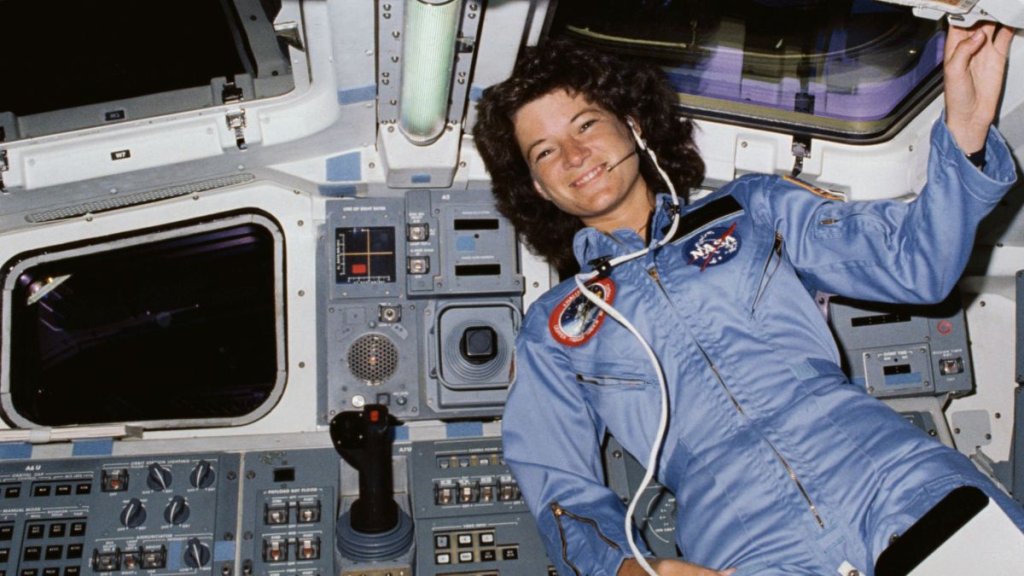Forty years ago today, the first American woman astronaut launched in the middle of a media storm.
Sally Ride, who spent nearly a week in orbit on the space shuttle starting June 18, 1983, later said in a NASA interview she faced “a flurry of media activity” and requests “just incessant for months.”
“Everybody wanted a piece of me,” Ride said in the 2002 oral history, recorded about 10 years before her death from cancer. Ride added that she regretted that being the first U.S. woman in space was not a more “normal occurrence” and as a result, received so much attention for the milestone.
The ruby anniversary of Ride’s flight coincidentally falls during Pride Month, first established nationally in 1999. Ride (who also once served as president of Space.com) chose to disclose her LGBTQ+ status posthumously; as such, she is also the first known member of that community to fly in space.
Related: Sally Ride’s Life Partner Weighs in on the Future of LGBTQ+ Astronauts
Ride, just finishing a Ph.D. in theoretical physics at Stanford University, joined NASA in 1978 in the astronaut class nicknamed “The Thirty-Five New Guys.” The group was specifically meant to bring in women and Black astronauts who had been systematically excluded from spaceflight for two decades. (NASA’s recruitment efforts included events with Nichelle Nichols, a Black woman who played an astronaut on “Star Trek“.)
Karen Panetta, a fellow of the Institute of Electrical and Electronics Engineers (IEEE) argued Ride played down her sexuality because she wanted to be judged on her capabilities. Ride’s attitude was “I’m here because I’m among the best, and gender didn’t even play a role,” Panetta told Space.com.
Panetta (who never met Ride) took a page from the astronaut’s book, saying she admired Ride for knowing how to “ignore the noise” that came from being the first flown woman astronaut at NASA.
For example: Panetta, now the dean of engineering at Tufts University, was once offered a position as the chair of her department. “In its 100-year history, [it] never had a woman female chair, and I said no,” Panetta said. “People were shocked: ‘You would have been the first!’ And it’s like, ‘That’s not why I want a job.’ I don’t want to be selected because I’m a woman. I want to be selected because of my skills.”
Instead, Panetta took those skills to found the international Nerd Girls program that has served more than 85,000 children, parents and educators through engineering outreach activities.
Related: NASA needs sharper diversity focus to boost representation, audit finds
Panetta pointed to the large waves that Ride left in the space world outside of the two space shuttle flights the astronaut is best remembered for. For example, Ride famously served on the investigation boards of two shuttle flights that failed, killing seven astronauts each: Challenger in 1986, and Columbia in 2003.
Panetta herself has incidental linkages with both flights. As a youngster she attended Challenger’s launch and witnessed the explosion that killed its crew, which included schoolteacher Christa McAuliffe. As for Columbia, Panetta interacted directly with members of the investigation board that served under Ride.
“Whenever I would work with them,” Panetta said of the Columbia investigators, who she invited to speak to classes, “they would say, ‘Oh, Sally’s brilliant. They would do a presentation and say, ‘Most of this came from Sally.’ ”
“What I loved about it,” she continued, “was (that) one of the things women struggle with — along with underrepresented groups — is that folks sometimes don’t give women credit for their ideas. Her camaraderie, and her ability to bring people in and make everybody feel valued, (caused them) to naturally gave back and attribute their successes to her.”
Related: 20 years after Columbia shuttle tragedy, NASA pledges ‘acute awareness’ of astronaut safety
Panetta was so inspired by Ride and astronauts like her that she once applied to be an astronaut candidate. Panetta was derided by some of her peers for thinking she was worthy of working at NASA. While Panetta nevertheless was not selected, she says that experience has shown her how important it is to be inclusive with students.
“My first opening when I meet with the students is, ‘What’s the dream?’ They’re like, ‘Math and science.’ I’m like, ‘No, no, what’s the dream? That’s not a dream’,” Panetta told Space.com.
“Some of them are closed up and are ashamed,” she continued. “They feel like you’re going to laugh at them for having big, aspirational goals. I think that’s something that for all young people, whether they’re engineers or not, Sally definitely embodied: It’s okay. You should have big dreams.”
Reflecting on Ride’s role in the LGBTQ+ community, Panetta said dreaming is especially important in underrepresented groups. “Nobody is like anybody else … everybody is unique and we should celebrate that,” she added.
“Sally definitely celebrated intellect, and energy, and (especially) the two words I always think of is respect and kindness. It doesn’t matter who you are — respect and kindness. That’s it.”

